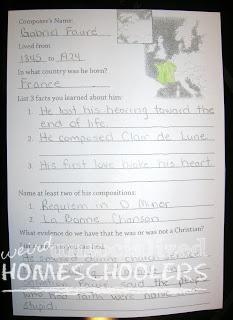Review: Bright Ideas Press
I love Bright Ideas Press. We’ve used the Christian Kids Explore science series for several years. It was from Bright Ideas Press’ Hands-On Geography book that I got the idea for our homeschool group’s annual Around the World Day. I was ecstatic when they sent me not one, but two products to review: Young Scholar’s Guide to Composers and Christian Kids Explore Physics, the only book in the science series that we didn’t already own!

Young Scholar’s Guide to Composer’s was just the kind of book I’ve been looking for to add to our curriculum list. Geared toward children in grades 4-8, it features 26 famous composers and 6 eras of music to make up 32 weeks of music study. It contains everything you need to study the featured composers except the music, which is easily found online or at your local library. The writers have made it easy to find the music online with an appendix listing websites and YouTube videos featuring work by the cited composers.
Here’s some of what you can expect to find to help you in your composer study:
- Concise, but comprehensive biographies of each composer
- Comprehension questions after each composer bio
- Quality coloring pages of each composer
- Printables, including timelines and composer cards
- Detailed instructions with photographs on how to make composer folder books
We, of course, did not use the book exactly as you’re “supposed” to, but that was simply because we were studying France for Around the World Day and wanted to be able to incorporate the study of French composers. So, we chose to study Debussy and Faure out of order…and we still really enjoyed the book.
I found the biographies to be a bit long for the attention span of my younger two who are just barely on the cusp of the young end of the age range. That was easily remedied by breaking the reading up into two days instead of just one. Everyone enjoyed the coloring pages and we worked together to fill out the composer cards.


I really liked that the authors included a guide for planning your composer study, giving you suggestions for what to do each day of the week. I also really appreciated the fact that they took into consideration the age-range for which Young Scholar’s Guide is intended, intentionally leaving out, for example, one well-known composer because his immoral lifestyle could not be covered — or even glossed over — in a way to make it appropriate for the book’s intended audience.
I highly recommend having the binding cut from this book and having it 3-hole drilled, which I do with most of my books containing reproducible pages. I didn’t do that with this book at first and it was really hard to get good, clean copies. It only cost me $0.80 to get the binding cut at my local office supply store and I 3-hole punched it myself.
Young Scholar’s Guide to Composers is available as a CD-Rom ($29.95) or a paperback book ($34.95).
Christian Kids Explore Physics is set up just like the other books in the Christian Kids Explore series. Each unit begins with a list of unit objectives, vocabulary words and materials needed, as well as a coloring page corresponding with the unit. There are weekly lessons within each unit with a Unit Wrap-Up at the end to review what students have learned. Christian Kids Explore Physics is geared towards kids in grades 4-8 and contains a glossary and suggested reading list. Each unit also offers Scripture tie-ins.
Isn’t 4-8th grades kind of early to begin teaching physics? I don’t think so. The very first year we homeschooled, a veteran homeschool mom gave me a wise piece of advice that I’ve never forgotten: when we teach our kids something, we’re not trying to teach them everything about a given topic; we’re giving them hooks upon which to hang later information.
It’s my opinion that if I cover things like chemistry and physics when my kids are young, accepting the fact that they aren’t going to retain it all, they’ll have a point of reference for when they hear this information again in later grades. I think that may just help it stick better when they’re older. Besides that, many of the topics covered in Christian Kids Explore Physics are things that kids are naturally interested in and curious about. Just look:
- States of matter (looking for an excuse to make some Flubber/Oobleck, anyone?)
- Mechanics (force, gravity, friction)
- Energy in motion (explores how radio and TV work, as well as sound and music)
- Energy and Magnetism (We might just have to make electricity with a potato in this unit.)
It is my opinion about each of the Christian Kids Explore books that they are not a stand-alone science program. However, I think they make a wonderful spine book and are easily “beefed up” with supplemental reading, some videos and some hands-on projects. At $34.95, Christian Kids Explore Physics, plus a library card, makes an excellent introduction to the world of physics.
I received this product free for the purpose of reviewing it. I received no other compensation for this review. The opinions expressed in this review are my personal, honest opinions. Actual results may vary. This post contains affiliate links. As an affiliate, I will receive a portion of the sale of any products purchased through links included in this post. Please read my full disclosure policy for more details.
Kris Bales is a newly-retired homeschool mom and the quirky, Christ-following, painfully honest founder (and former owner) of Weird, Unsocialized Homeschoolers. She has a pretty serious addiction to sweet tea and Words with Friends. Kris and her husband of over 30 years are parents to three amazing homeschool grads. They share their home with three dogs, two cats, a ball python, a bearded dragon, and seven birds.



two questions/comments:
1. I want to order that CD. It looks like JUST what I need to jump start music in my house 🙂 But does the CD have EVERYTHING that the book does? Meaning I can print it out as we go?
2. My son is 7, a 3rd grader, and Science (especially physics) is his favorite subject. He almost memorized "Physics for Every Child"…He wants to be an engineer (this week…)
I was sent the print books, so I'm not 100% sure, but I would assume that the CD would contain everything that the book does, just in CD form.
That's cool about your son. Too often, I think we underestimate what kids are capable of understanding.